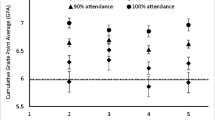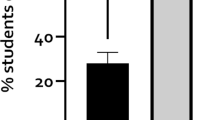Abstract
Many medical students use spaced repetition as a study strategy to improve knowledge retention, and there has been growing interest from medical students in using flashcard software, such as Anki, to implement spaced repetition. Previous studies have provided insights into the relationship between medical students’ use of spaced repetition and exam performance, but most of these studies have relied on self-reports. Novel insights about how medical students use spaced repetition can be gleaned from research that takes advantage of the ability of digital interfaces to log detailed data about how students use software. This study is unique in its use of data extracted from students’ digital Anki data files, and those data are used to compare study patterns over the first year of medical school. Implementation of spaced repetition was compared between two groups of students who were retrospectively grouped based on average performance on three exams throughout the first year of medical school. Results indicate that students in the higher scoring group studied more total flashcards and implemented spaced repetition via Anki earlier in the year compared to the lower scoring group. These findings raise the possibility that implementing spaced repetition as a study strategy early in medical school may be related to improved knowledge retention and exam performance. Additional research should be performed at more sites to further examine the relationship between spaced repetition implementation and exam performance.

Similar content being viewed by others
Availability of Data and Material
Not available.
References
Lu M, Farhat JH, Beck Dallaghan GL. Enhanced learning and retention of medical knowledge using the mobile flash card application Anki. Med Sci Educ. 2021;31(6):1975–1981. Published 1 Sep 2021. https://doi.org/10.1007/s40670-021-01386-9.
Deng F, Gluckstein JA, Larsen DP. Student-directed retrieval practice is a predictor of medical licensing examination performance [published correction appears in Perspect Med Educ. 18 Nov 2016;:]. Perspect Med Educ. 2015;4(6):308–13. https://doi.org/10.1007/s40037-015-0220-x.
Wu JH, Gruppuso PA, Adashi EY. The self-directed medical student curriculum. JAMA. 2021;326(20):2005–6. https://doi.org/10.1001/jama.2021.16312.
Harris DM, Chiang M. An analysis of Anki usage and strategy of first-year medical students in a structure and function course. Cureus. 2022;14(3):e23530. Published 27 Mar 2022. https://doi.org/10.7759/cureus.23530.
Rana T, Laoteppitaks C, Zhang G, Troutman G, Chandra S. An investigation of Anki flashcards as a study tool among first year medical students learning anatomy. FASEB J. 2020;34(S1):1.
Sun M, Tsai S, Engle DL, Holmer S. Spaced repetition flashcards for teaching medical students psychiatry. Med Sci Educ. 2021;31(3):1125–31. Published 6 Apr 2021. https://doi.org/10.1007/s40670-021-01286-y.
Anki. https://apps.ankiweb.net/. Accessed 1 June 2021.
Lambers A, Talia AJ. Spaced repetition learning as a tool for orthopedic surgical education: a prospective cohort study on a training examination. J Surg Educ. 2021;78(1):134–9. https://doi.org/10.1016/j.jsurg.2020.07.002.
Larsen DP, Butler AC, Roediger HL 3rd. Test-enhanced learning in medical education. Med Educ. 2008;42(10):959–66. https://doi.org/10.1111/j.1365-2923.2008.03124.x.
Schneid SD, Pashler H, Armour C. How much basic science content do second-year medical students remember from their first year? Med Teach. 2019;41(2):231–3. https://doi.org/10.1080/0142159X.2018.1426845.
Dobson J, Linderholm T, Perez J. Retrieval practice enhances the ability to evaluate complex physiology information. Med Educ. 2018;52(5):513–25. https://doi.org/10.1111/medu.13503.
Roediger HL 3rd, Butler AC. The critical role of retrieval practice in long-term retention. Trends Cogn Sci. 2011;15(1):20–7. https://doi.org/10.1016/j.tics.2010.09.003.
Karpicke JD, Roediger HL 3rd. The critical importance of retrieval for learning. Sci. 2008;319(5865):966–8. https://doi.org/10.1126/science.1152408.
Pumilia CA, Lessans S, Harris D. An evidence-based guide for medical students: how to optimize the use of expanded-retrieval platforms. Cureus. 2020;12(9):e10372. Published 11 Sep 2020. https://doi.org/10.7759/cureus.10372.
Tsai S, Sun M, Asbury ML, Weber JM, Truong T, Deans E. Novel spaced repetition flashcard system for the in-training examination for obstetrics and gynecology [published correction appears in Med Sci Educ. 2021;31(4):1559]. Med Sci Educ. 2021;31(4):1393–99. Published 19 May 2021. https://doi.org/10.1007/s40670-021-01320-z.
Kumar AD, Shah MK, Maley JH, Evron J, Gyftopoulos A, Miller C. Preparing to take the USMLE Step 1: a survey on medical students’ self-reported study habits. Postgrad Med J. 2015;91(1075):257–61. https://doi.org/10.1136/postgradmedj-2014-133081.
Jape D, Zhou J, Bullock S. A spaced-repetition approach to enhance medical student learning and engagement in medical pharmacology. BMC Med Educ. 2022;22(1):337. Published 2 May 2022. https://doi.org/10.1186/s12909-022-03324-8.
Landoll RR, Bennion LD, Maggio LA. Understanding excellence: a qualitative analysis of high-performing learner study strategies. Med Sci Educ. 2021;31(3):1101–8. Published 25 Mar 2021. https://doi.org/10.1007/s40670-021-01279-x.
Author information
Authors and Affiliations
Contributions
All authors contributed to the study conception and design and data collection. Data analysis was performed by Nathaniel Brooke, Robert C. Wallon, and Barbara Masi. The first draft of the manuscript was written by Anila Mehta and all authors contributed to critical revisions of the manuscript. All authors read and approved the final manuscript.
Corresponding author
Ethics declarations
Ethics Approval and Consent to Participate
Authors consent.
Consent for Publication
Authors consent.
Competing Interests
The authors declare no competing interests.
Additional information
Publisher's Note
Springer Nature remains neutral with regard to jurisdictional claims in published maps and institutional affiliations.
Rights and permissions
Springer Nature or its licensor (e.g. a society or other partner) holds exclusive rights to this article under a publishing agreement with the author(s) or other rightsholder(s); author self-archiving of the accepted manuscript version of this article is solely governed by the terms of such publishing agreement and applicable law.
About this article
Cite this article
Mehta, A., Brooke, N., Puskar, A. et al. Implementation of Spaced Repetition by First-Year Medical Students: a Retrospective Comparison Based on Summative Exam Performance. Med.Sci.Educ. 33, 1089–1094 (2023). https://doi.org/10.1007/s40670-023-01839-3
Accepted:
Published:
Issue Date:
DOI: https://doi.org/10.1007/s40670-023-01839-3




